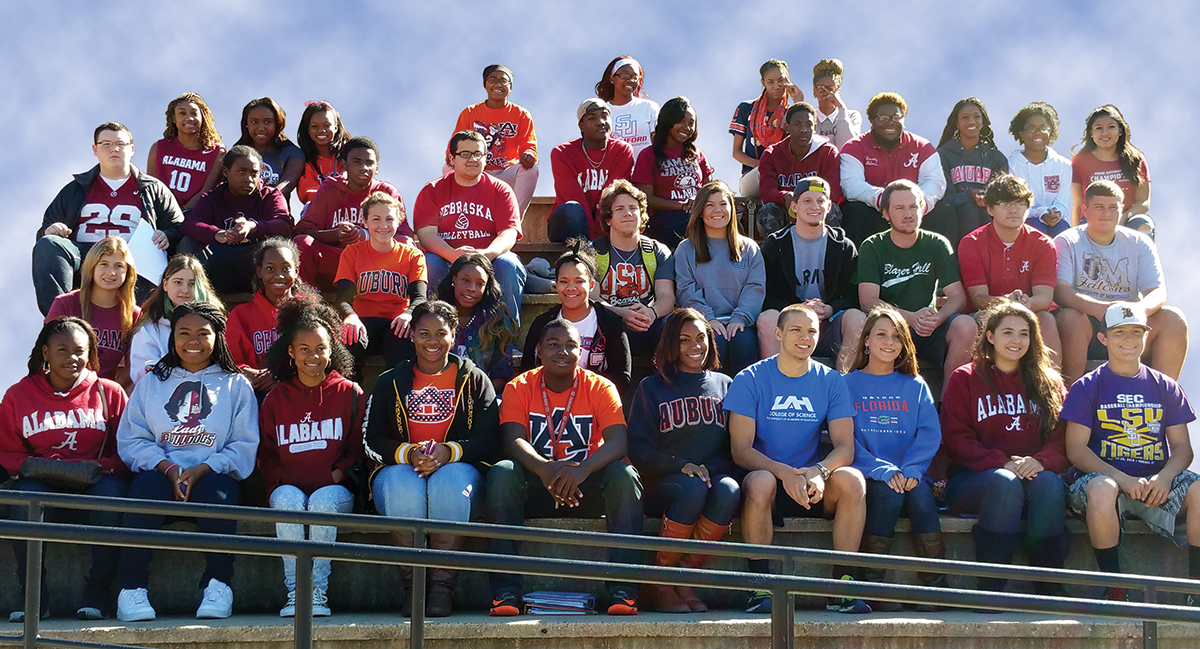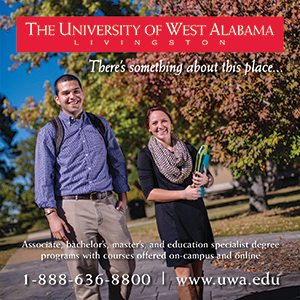
Advice from experts on choosing and applying to college
| Click here for a listing of Alabama Colleges and Universities |
[column width=”1/4″] [/column] By Allison Griffin
[/column] By Allison Griffin
The senior year of high school is packed with excitement and anticipation. But for some students and parents, the prospect of applying for college, evaluating schools and worrying about financial aid overshadows the fun. A little planning and wise advice can help take the stress out of the process. Read on to get some tips from experts.
Start preparing for college early. As in, freshman year.
“What I try to tell students is that, in their freshman year, they’re starting their high school career with the same GPA that seniors want to have when they finish — a 4.0,” says Dr. Taqua Lewis, junior and senior guidance counselor at Pinson Valley High School. The only way to keep it at a 4.0 is to study and work hard, and it’s far easier to start ahead than it is to dig out of a hole.
Fill out a Free Application for Financial Student Aid (FAFSA) form, regardless of the family’s financial status.
That’s because you don’t know what financial aid options might be available to you. “Schools have in-house or stimulus money, or state funds that the students may qualify for,” says Willieta Conner, education specialist with the Alabama State Department of Education.
And every year you should reapply, she says. “You may not be eligible your freshman year, but when you get to your sophomore year, something may change.”
Get your applications in as soon as possible.
In many areas, it’s not just a matter of getting accepted at the college, says Dr. Greg Fitch, executive director of the Alabama Commission on Higher Education. “It may be a matter of getting on track with the type of degree that you’re looking for,” he says.
For example, at the two-year schools, a majority of nurses graduate with an associate’s degree, and the nursing classes start right away, with few survey courses. “You need to be prepared for that,” Fitch says.
Don’t be intimidated by the application process.
Lewis calls today’s high school students the “microwave generation,” because they want everything instantly. They like quick results, and might be discouraged from applying to college by forms and paperwork. Fortunately, today’s colleges allow online applications, which don’t seem quite as intimidating.
While school guidance counselors and teachers can be encouragers, parents need to push the students to apply to schools and ensure that all the forms are filled out correctly and in a timely fashion. “A lot of parents may not have gone to college,” Conner says, “but they can explain to their children why this is a good thing.”
Don’t take a shotgun approach to applying to schools.
Applying to many schools isn’t worth the effort or the expense, and isn’t realistic. There’s no point applying to a school that doesn’t offer your intended major, Lewis says, or that requires a tuition that is too far out of your family’s price range.
She tells students to do their research online, armed with their current GPA. “Realistically look at your grades, their admissions requirements, (figure out) if you meet their minimum requirements, and if you do, does that school offer what you’re interested in?” Lewis says.
She advises students to have three school choices: The No. 1 choice, “where I want to go, beyond a shadow of a doubt,” and an option two if No. 1 doesn’t work out. Finally, an option three — “if neither of those works out, I can live with No. 3.”
And keep a realistic view of your previous high school coursework. Lewis wwsays she’s had students who tell her they want to be doctors, but who clearly haven’t been on that track in high school and haven’t taken the upper level math and science classes. In those cases, she’ll suggest looking at other options in the medical field — not to deflate a student’s dream, but to steer the student toward a more realistic career goal.
Don’t stress over the choice of majors.
While the undeclared major can be interpreted as a lack of direction in some students, remember that it is not required for a student to declare a major when he or she arrives on campus.
“I think there is a misconception, and it’s often on the part of the parents, that the student has to know what they want to major in,” says Buddy Starling, dean of enrollment at Troy University. “Parents seem to stress over that more than the students. Sometimes parental stress is student stress.”
Remember that college accolades aren’t everything.
Most colleges and universities can point to at least one national ranking on which they’ve scored well, compared to other schools. Such accolades are relevant, but keep in mind that the most important quality in choosing the right college is fit.
“I think there’s a certain feeling when you get when you’re on a college campus,” Starling says. “Sometimes you just know it’s right, and sometimes you know it’s not so right. So perhaps the intangibles are more significant than the tangibles.”
Lewis advises parents to not hold too strongly to the dreams of a child attending their alma mater, especially if the student is leaning toward another school. “I let them know, mom and dad … this is about them, not about you. At the end of the day, they have to be happy with the decision they’ve made.”
[hr]
[box]
Seniors encouraged by College Application Campaign
Not every student is cut out for college, but a number of potential students may be overlooked because of a lack of encouragement to apply. Giving those students a good shot at a collegiate career is the goal of a state-funded program called the College Application Campaign.
In the first year, the campaign piloted with 10 Alabama high schools; this year, the Alabama State Department of Education took the campaign statewide, and has 216 schools participating, says Willietta Conner, education specialist with ALSDE and the campaign’s state coordinator.
The school guidance counselor serves as the site coordinator, with other people on the team – teachers, administrators and graduation coaches. They work as a team to get the seniors to apply to college early in the year.
The focus is on first-generation college students, who would not normally apply early, as well as some who may not have decided what they want to do in the fall of their senior year.
But the program isn’t limited to the 12th grade; some middle schools are even embracing the concept, Conner says.
“That sends a strong message, because the sooner the students start getting their information, the better prepared they are by their senior year,” she says.
The campaign team uses promotional items, such as student buttons that say “I applied to college,” and teachers decorate their doors and classrooms with banners to promote a college-going culture. Some schools host college fairs; some colleges send counselors to the high schools to help seniors with applications and FAFSA forms. Some host “college colors” day, and encourage students to wear gear from the colleges to which they’ve applied.
So far, the results are encouraging, Conner says. The seniors take pride in completing their applications and the memorabilia they receive; that inspires the juniors to want to participate too.
For more information, contact Willietta Conner at [email protected].
[/box]






